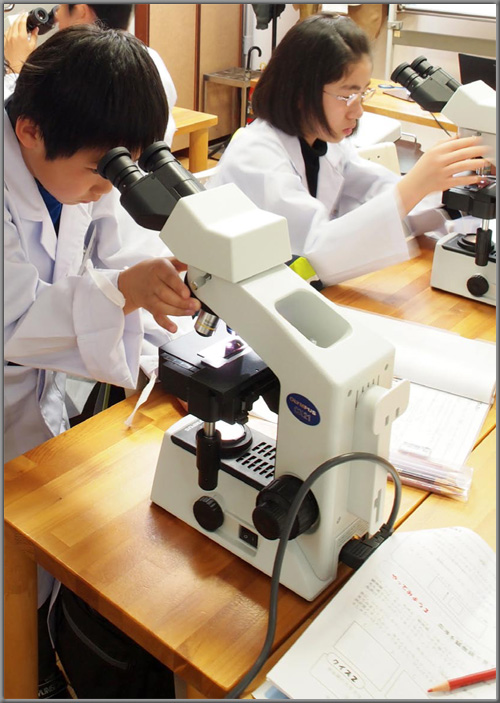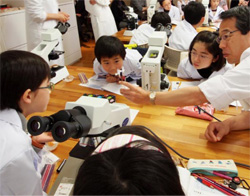Home > Highlighting JAPAN > Highlighting Japan JUNE 2012 > The Young Doctors
Highlighting JAPAN
COVER STORY: Life Innovation for the World

Caption: Students peers at cells through a microscope.
Credit: TADASHI AIZAWA
The Young Doctors
Fostering children with an interest in the workings of the human body will encourage many to play a role in life innovation in the future. Classes given by practicing doctors to Tokyo children can be seen as one effort in this direction. Osamu Sawaji of the Japan Journal reports.

Students at the Tokyo Kids Medical School show their curiosity.
Credit: TADASHI AIZAWA
Dr. Megumi Sawada gently asks this question in a hotel function room in the Tokyo suburb of Musashino. Eight elementary school students in white lab coats then try hard to figure out the difference by looking closely at the content of the syringes.
The Tokyo Kids Medical School, where Dr. Sawada serves as head, gives monthly medical classes to third to sixth grade elementary students. The students use actual medical equipment to learn about human body systems, health and illness.
This day's theme is blood. The students expand their knowledge on the functions, types and diseases of blood as they work on quizzes. They look closely at the blood through a microscope and make sketches of red blood cells and platelets. Several instructors apart from Dr. Sawada stand by the students to provide close support with their experiments and learning.
"I took this class because I wanted to do a real experiment," says one sixth grader boy. "It was interesting to peer through a microscope. My grandfather is a doctor, and he looks really happy when his patients get better. I want to be a doctor like him and make lots of patients healthier."
The Tokyo Kids Medical School began with an idea of Dr. Sawada. When raising her own children she thought that today's students were surrounded by pseudo-medical science lacking scientific grounding and that there was a need to communicate proper and real medical science to them. At first, she voluntarily gave classes to her own student and her student's friends at her home, but she launched medical classes for other students from 2011.
The Tokyo Kids Medical School holds twelve classes a year designed so students can have fun learning about various themes such as the heart, respiration, digestion, cancer, and the job of a surgeon, using real medical instruments such as endoscopes and echo equipment.
"I want to foster wise medical consumers who not only receive healthcare treatment when they are sick, but also know their illness and the drugs being prescribed," says Dr. Sawada. "At the same time, I would also like students to know the value of life and health."
© 2009 Cabinet Office, Government of Japan






